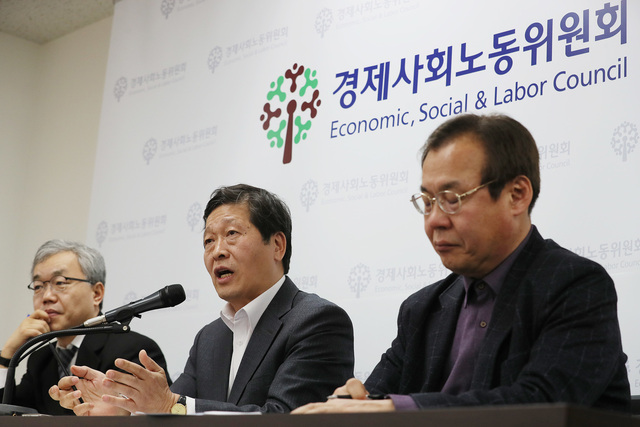Posted on : Mar.20,2019 16:40 KST
 |
|
The Economic, Social and Labor Council’s labor-management relations improvement committee holds a press conference in Seoul on Mar. 18. (Yonhap News)
|
The Economic, Social and Labor Council (ESLC) remains adrift in its discussions toward ratifying key International Labour Organization (ILO) conventions. Much of the fault here lies with unreasonable demands from the business community. In a Mar. 18 talk with reporters, public interest members of the ESLC’s labor-management relations improvement committee criticized the business world for the “repeatedly stating positions that are realistically unacceptable.”
The business world’s demands include recognition of substitute labor during strikes, the abolition of systems prohibiting unfair labor practices, a ban on workplace occupation during strikes, and extension of the validity period for collective agreements. The demands for substitute labor recognition and the abolition of the prohibition of unfair labor practices are particularly excessive, as they restrict workers’ three constitutionally guaranteed labor rights.
The ILO maintains that substitute labor during strikes is contrary to global labor standards, and that unfair labor practices should be sternly punished. In a setting for discussing the ratification of core ILO conventions, the business community is making claims that run counter to international labor standards. Even with the public interest committee members allowing discussions on the remaining demands, the business world remains intransigent.
The public interest committee members have requested priority discussion on tasks acceptable to both labor and management so that an agreement can be reached before the end of March. The reason has to do with trade dispute fears with the EU. When it concluded an FTA with the EU in 2005, the South Korean government pledged to ratify the key ILO agreements. In a letter of protest to Seoul on Mar. 4, the European Commissioner for Trade warned that if the conventions’ ratification was delayed any longer, things would proceed to the next stage (referral to the expert panel). That referral marks the beginning of the trade dispute stage. The deadline given by the EU falls before the scheduled South Korea-EU trade committee meeting in Seoul on Apr. 9.
The public interest committee members have begged for a compromise to prevent South Korea from becoming the first country ever to be in violation of a free trade agreement’s labor rights provisions. But in a statement, the Korea Employers Federation (KEF) continued with the same position, insisting that it could “not accept something intended to put the business community’s demands off until later.”
The business world is constantly talking about “global standards.” Global standards have been cited when demanding deregulation and wage system revisions or when opposing corporate governance structure improvements and the introduction of a cooperative profit-sharing system. Their argument is that now that South Korea has joined the ranks of the advanced economies, it needs to follow along with the global standard. Yet the same business world opposes ratifying the key ILO conventions despite the international community’s pleas. This is a shameless attempt to pick and choose what “global standards” suit their tastes.
Please direct comments or questions to [english@hani.co.kr]






